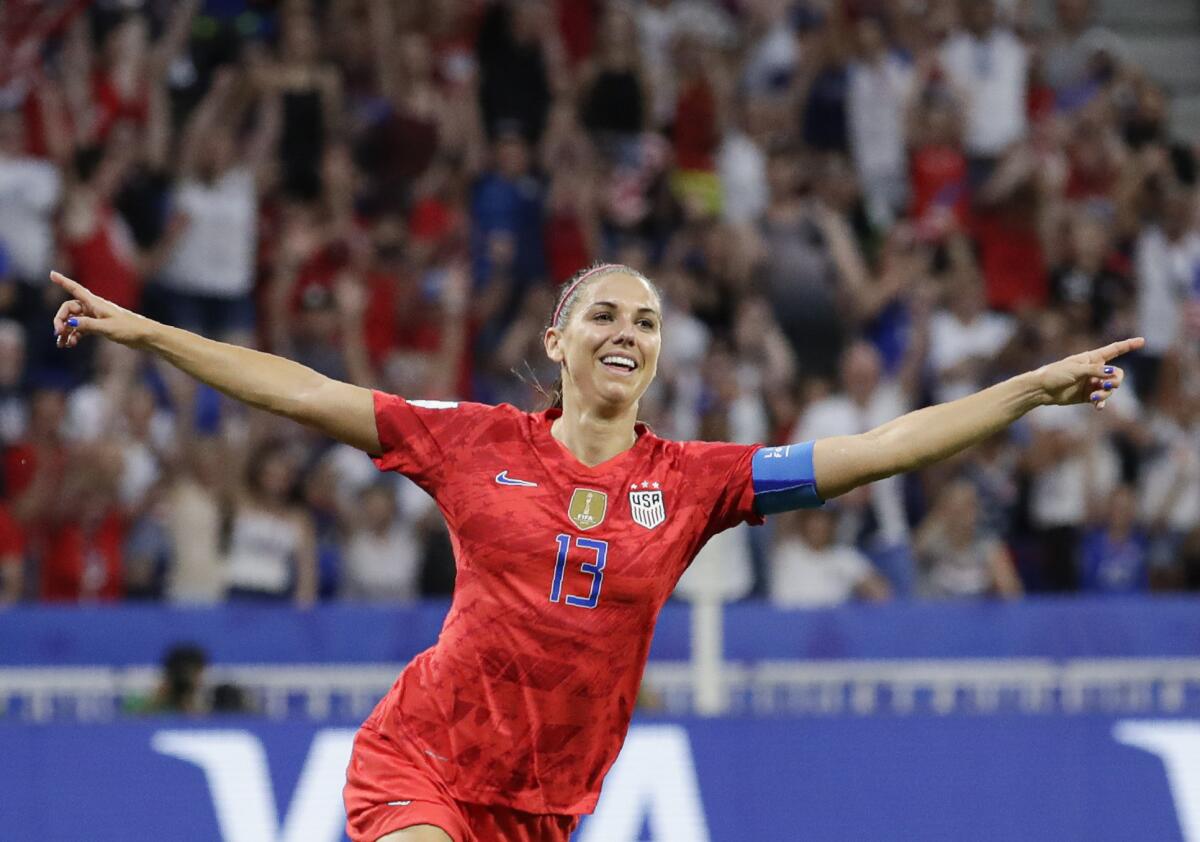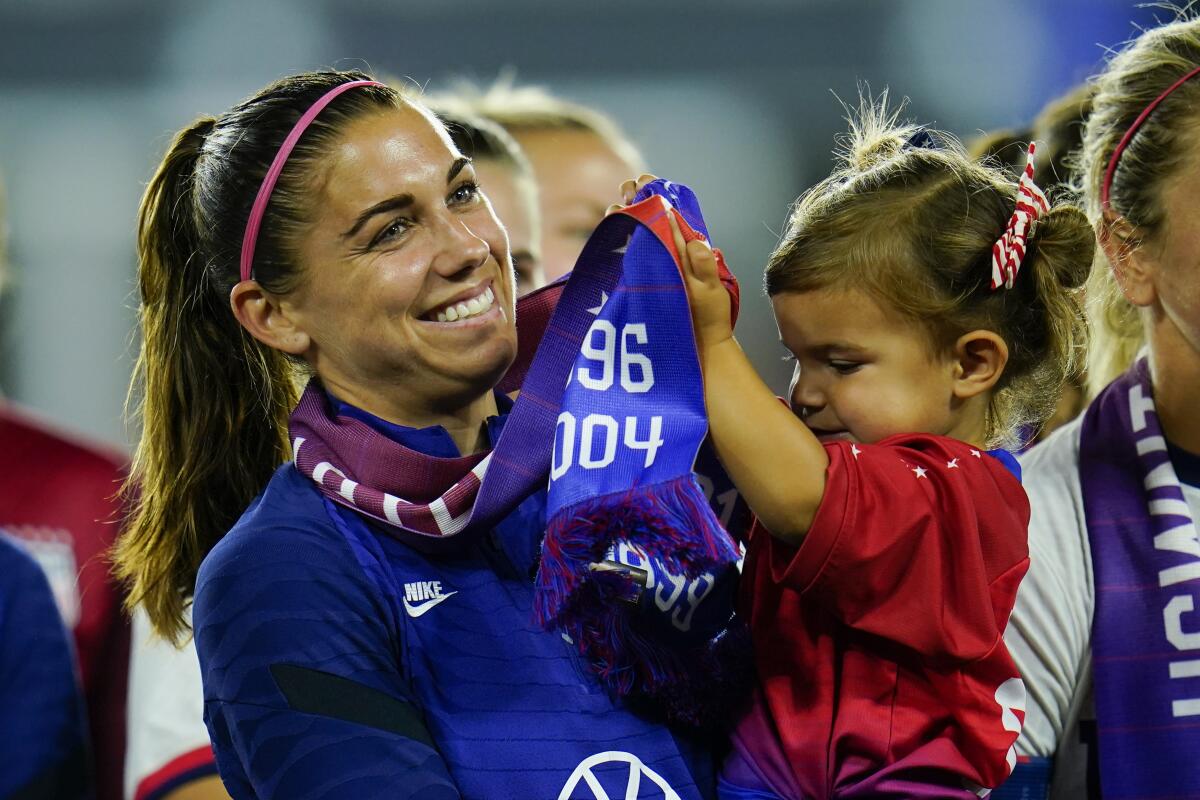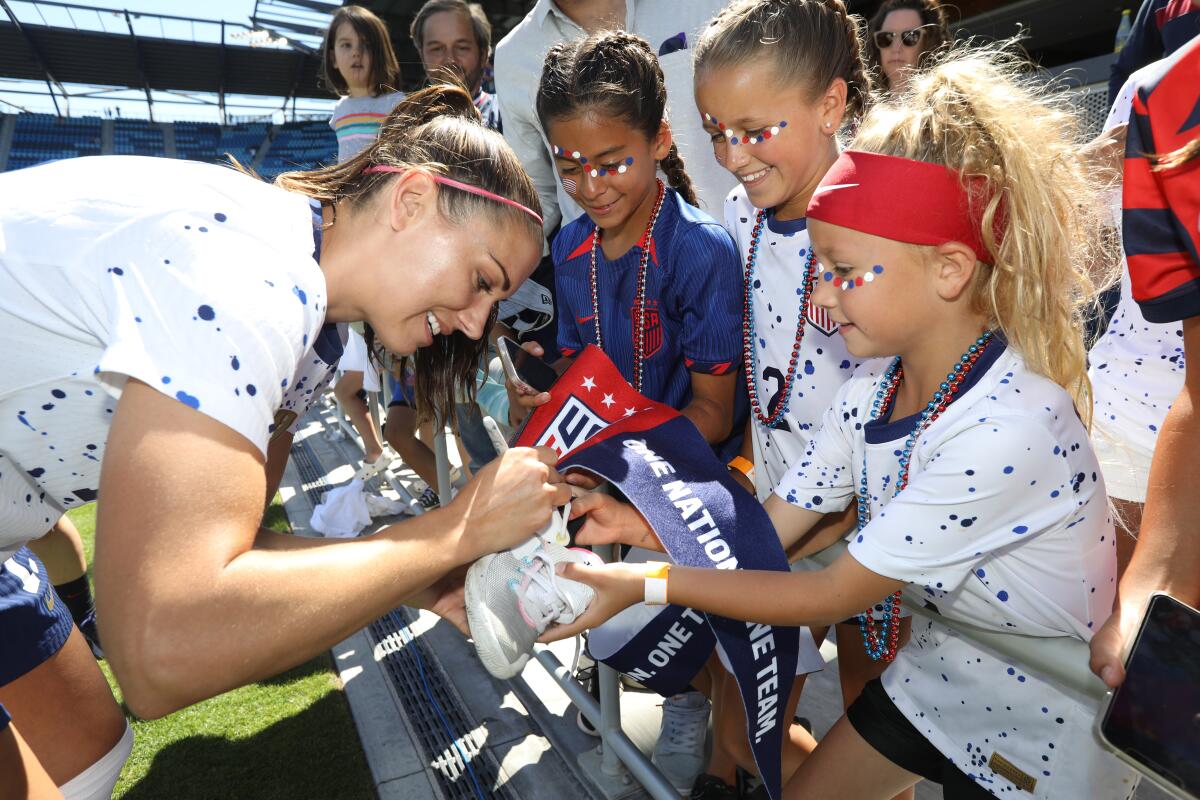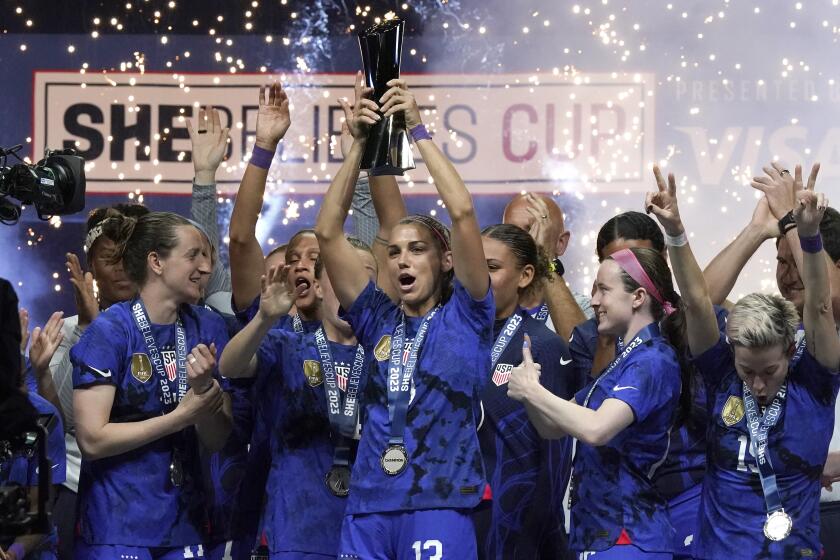Alex Morgan retires as a U.S. soccer star, but her greatest impact was off the pitch

- Share via
I wasn’t looking for Alex Morgan when I stopped by the San Diego Wave’s sprawling practice facility last month. I was there to talk to Landon Donovan, the other national team legend, who had just been named the Wave’s interim coach.
But Morgan sidled over after practice anyway and we talked for about 20 minutes. She chatted about her daughter, Charlie, who has been the subject of most conversations with Morgan over the last four years. But she also talked about her charitable foundation, the businesses she hopes to start, her husband, Servando Carrasco, and the homemade food she prepares for her two dogs.
What she didn’t talk about was soccer. And if ever there was a sign that Morgan was ready to move on from the sport that had long defined her life, that conversation on a windswept bluff overlooking the 5 Freeway was it.
On Thursday, Morgan made it official, announcing her retirement from professional soccer in an emotional 4?-minute video she posted to social media. She’ll play her final game Sunday in San Diego, her new hometown, against the North Carolina Courage.
“I’m retiring,” she said during the video, in which she also announced she is pregnant again. “And I have so much clarity about this decision. It has been a long time coming, and this decision wasn’t easy.
“Soccer’s been a part of me for 30 years,” she continued, pausing frequently to take deep breaths and compose herself. “It was one of the first things I ever loved. I gave everything to this sport, and what I got in return was more than I could have ever dreamed of.”
Morgan, 35, who learned the game playing on AYSO teams in Diamond Bar, will leave as one of the greatest players ever. A two-time World Cup champion, Olympic gold medalist and NWSL titlist, Morgan was also a three-time finalist for FIFA’s world player of the year. Her 123 international goals — 14 more than Lionel Messi — rank ninth all-time, regardless of gender.
But she wasn’t just a scorer, she was a winner: In the 86 international matches in which she had a goal, the U.S. never lost, going 76-0-10.
End of an era? Alex Morgan, a two-time World Cup champion and Olympic gold medalist, won’t be in Paris with the U.S. women’s national team this year.
“In a storied USWNT program, Alex has been one of the all-time bests to wear the jersey,” said Jill Ellis, who coached Morgan to her two World Cup titles and then, as president of the Wave, made Morgan the centerpiece of the expansion team’s first roster.
Wherever she went during much of her 15-year professional career, Morgan was trailed by a legion of young fans, their hair tucked into a tight ponytail like Morgan’s and their tiny bodies wrapped in Morgan’s No. 13 jersey. A typical home game ended with Morgan patiently walking the length of the grandstands, signing autographs and posing for photos.
Partly as a result, Morgan became one of the world’s most popular players and the USWNT has become the country’s most popular women’s national team. In Morgan’s first season, the team averaged fewer than 6,000 fans for eight home games; in her last full season, it drew more than three times as many.
“She’s grown into this role. I think she could see what it meant to the girls,” said her father, Mike, one of her first coaches and still her greatest cheerleader.

Yet she did more to change the game off the field. She was a relentless and outspoken advocate for women’s sports, suing FIFA over its use of artificial turf fields in the 2015 World Cup, then serving as the lead plaintiff in the national team’s lawsuit against its own federation, one that led to a historic agreement with U.S. Soccer to pay the men’s and women’s national teams equally.
Once U.S. Soccer’s “it girl,” as likely to land on the cover of Sports Illustrated in a swimsuit as in a soccer kit, Morgan, matured into a two-time selection for Time magazine’s 100 most influential people.
“Her impact has been beyond medals and trophies,” Ellis added. “Her legacy to the game will be the doors she helped open and the young players she inspired.”
But like all great players, Morgan couldn’t outrun time. After taking time off to give birth to Charlie, Morgan had to earn her way back on to the national team for the Tokyo Olympics. A year later she had her last dominant international performance, scoring a tournament-best three goals — including the winner in the final against Canada — to lead the U.S. to the CONCACAF W championship in Mexico.
Alex Morgan is more than just a soccer icon. The two-time World Cup winner has played a leading role on and off the field in helping women flourish.
That year she also won her first NWSL Golden Boot, scoring a league-leading 15 goals. But hampered by injuries and poor form, she has scored just 10 times for club and country in the last two years, getting shut out in last summer’s World Cup and failing to make the roster for this summer’s Olympics, the first major tournament she’s missed since 2008.
In her absence, forwards Mallory Swanson, Trinity Rodman and Sophia Smith — none of whom are older than 26 — combined for 10 goals to give the U.S. its first Olympic title since 2012. The torch, Morgan acknowledged, had been passed.
In her retirement video, which she ended by thanking the fans, Morgan touched on her coming transition from soccer superstar to soccer mom and the role she played in opening that door.

“Charlie came up to me the other day and said that when she grows up she wants to be a soccer player,” Morgan said. “It just made me immensely proud. Not because I wish for her to be a soccer player when she grows up, but because a pathway exists that even a 4-year-old can see now.
“We’re changing lives. The impact we have on the next generation is irreversible, and I’m proud in the hand I had in making that happen and pushing the game forward and leaving it in a place that I’m both happy and proud of.”










